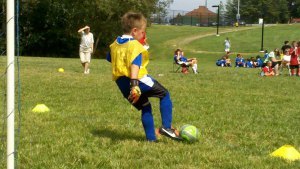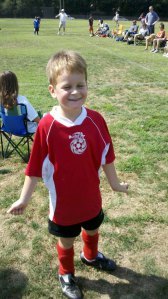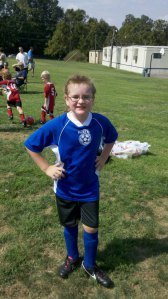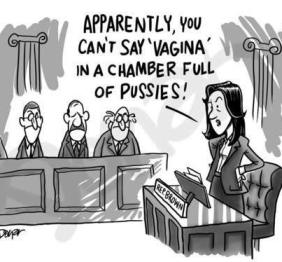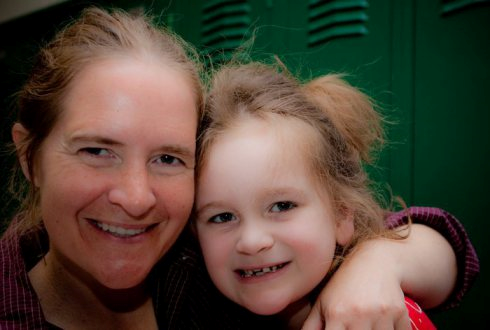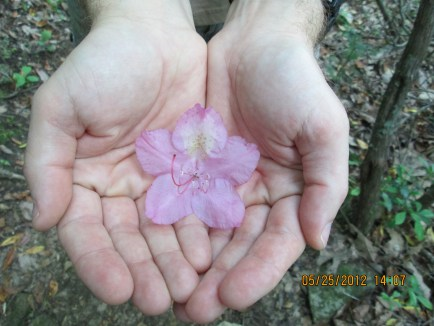E.L. Farris's Blog
January 17, 2016
Tales of Woe from the Soccer Field
It’s Tuesday afternoon. He runs into my room wearing cleats, shin guards and socks that are so long on his still tiny legs that they reach up over his knees and need to be folded over. I sigh and follow him down the stairs and out into the garage, and before I get in and turn the key in the ignition, I put a hand on his cheek. “You going to have fun and listen, right?”
He nods. I take a deep breath and hope it will be different, but some things either don’t change, or aren’t going to change for a long time. He’s no more a soccer player than I’m a soccer mom.
That’s part of the problem: me. I’m an abject failure at this so far. Last Tuesday, we had three kids that had to make it to practice at 5:30 p.m., and the practices were in three locations. Our daughter rode with neighbors, and I drew the easiest lot: taking our middle son, Jim, to his practice.
I paced around and fidgeted and tried to watch Jim run through his drills. I talked to other moms. And then, at 6:15, I checked my watch. Practice was ending at 7, which meant I had time for a 3-mile run. Twenty minutes later, I paused in the thick early September air and checked my watch. It was 6:33, which gave me plenty of time to make it back to the fields with ten minutes to spare. I smiled. Damn, was I on my game, for once.
As I loped back onto field eight a little bit later, a sense of panic overtook me. Those aren’t the same kids, I realized.
Then I heard a little voice screeching my name, “Mom!”
I caught a glimpse of my son standing on the running board of a tan SUV. What the hell is going on, I muttered, and before I could ask the coach what happened, my husband drove up in his black sedan, and smiled at me. The coach had called him because, well, practice had ended at 6:30. I apologized of course, but I felt awful.
At Wendy’s an hour later, I looked over my diet soda at my husband. “How did it go?”
He shook his head. And then, with a bemused smile, he replied, “Ben went searching for fossils.”
I chuckled. “Fossils?”
“Yeah. And when the team scrimmaged, he walked off the field, in search of four leaf clovers.”
“Oh.”
“Yeah,” he nodded, his facial expression switching between laughter and frustration. “And then, when the coach told the kids to run around the field, he was in the lead. Then he stopped to look at something. And then, when he ran next to his teammates, they turned left, to follow the field, and he turned right, ran down a hill, and in the opposite direction from everyone else.”
I covered my eyes and giggled. “Wow.”
“Will you please take him next time?”
I looked over at my children, who were busy eating and elbowing each other. “I’ll take him to his game Saturday.”
Fast forward to Saturday’s game. I fidgeted and paced and observed Ben doing anything on the field but playing soccer. He never even touched the ball. When it came his way, he seemed to run in the opposite direction. He bent over in search of bones, fossils, pretty crystals (rocks) and four leaf clovers.
Seeing a couple of dads running around the fields, I joined them. Maybe if I help out, I can get Ben engaged, or so I thought. I had no effect on Ben, other than to confuse the hell out of him. The other dads ignored me. It felt like I was invisible. And then the ball flew toward me, and I’ve replayed this over and over again, because I’m not sure if I did this on purpose or was completely passive when the ball hit me in the hip. I suspect that it was a little bit of both. I’m a lifetime athlete, and when a ball comes my way, my instinct is to go and get it. This instinct to go for the ball is every bit as strong as a border collie’s instinct to herd, or a golden retriever’s inability NOT to chase after an object in flight.
Whatever I did or didn’t do, I wasn’t expecting what happened. The other dad on the field helping our team, an assistant coach, yelled at me to get off the field. “Let the kids play.” And so, with my head down and my face and neck turning even redder than the sun was making them, I headed off the field, where my in-laws sat.
“That was your fault,” my father-in-law snapped at me as he caught me muttering a protest under my breath. “You should not have gotten in the way of the ball. This isn’t your game.”
I stood there, several feet away from him, and tried to listen to this friend of mine, this dad who always has a story to tell, but I couldn’t follow him. Tears were falling down my face, and even though my dark sunglasses hid my eyes, he could see me shaking all over.
“Hey,” he whispered, as he reached out and put a hand on my shoulder. “It’s okay. I’ve been ordered off the field before. To be honest, you did get in the way of the ball.”
“I know,” I sobbed, barely able to speak, “But I’m so embarrassed. Why did he have to do that? Yell at me in front of everyone else? And then my father-in-law has gotta pile on, and he’s never said a nice word to me, not ever.” I cried harder and harder, and my friend listened and tried to make me feel better.
“I’d give you a hug,” he added, his eyes moving from the field to me and back to the field, “But I don’t wanna embarrass you.”
“Thank you,” I whispered.
Sometime in the middle of this, my daughter had arrived, still wearing her soccer uniform from her earlier game. She tried her best to make me feel better, and I tried my best not to cry in front of her. After the game ended, I tracked down the assistant coach, and with tears again falling, I asked him not to ever yell at me in public, and explained about my son, and how he’s doing his best. And so was I.
As I touched Ben’s cheek on Tuesday afternoon, all of this flashed through my mind, and I knew it wouldn’t be any better at practice, but I knew I wouldn’t love my son any less. Sure enough, we couldn’t find the practice field, and I was too anxious and nervous to ask anyone. We were a few minutes late. And we forgot our ball. And Ben ran in the wrong direction of the ball, searched for four leaf clovers, hung off the goal posts, and barely a soccer ball.
When it was over, he asked me how he did. With his gray-blue eyes looking very blue, he chirped, “Am I a good soccer player, Mom?”
I looked down into his eyes and thought of my friend, the dad who put a hand on my shoulder when I cried tears of humiliation and frustration at Ben’s game on Saturday, and I smiled. I wrapped my arm around his shoulders and kissed his head. “I love you.”
“But am I a good soccer player?”
I’m not a fan of lying to my son. The truth is, he’s no more a soccer player than I’m a soccer Mom. And in the grand scheme of things, that’s okay. And we’re going to be okay.
I smiled at him. “I love you.” With eyes shielded from the setting sun, I held his hand and we rambled off to face the close of another day.
Baby Steps: Thirty Seconds of Chocolate
After I look out the bedroom window for her black Lexus, I run downstairs and pull all of the blinds shut. She can’t see in. But she can still get in through the garage. The combination is my birthday and I should change that but I don’t remember how. I gotta figure that out.
I check the door that leads to the garage. We’ve taped the lock so that the kids won’t accidentally turn the lock and now I gotta tear the tape off as fast as I can and I’m fumbling with the tape and it won’t move and if she opened the door right now I couldn’t stop her. Wait. Slow down, I whisper. Go slow, methodical, and find an edge. I feel beneath the knob and pull at a shred of the thick, clear tape and I feel the fear pressing in as fast as I can push it away but no, I whisper, just pull it slow.
And I do. I rip off a shred and then more tape, until I can turn the handle from vertical to horizontal. It’s locked. I’m safe for the moment. Yet I am the hunted, not the hunter.
Once the doors are secured, I tiptoe upstairs, locking the bedroom door behind me. If she wanted to get it, she could. Anyone can open the bedroom door with a sharp edge, like a credit card or a quarter, but I need the extra fake security that the cruddy lock gives me. I need it even though I know it’s not real security. What’s real anyway? My fear is real.
I take the hottest shower I can take. That’s what I did as a teenager. I locked that bathroom door and turned the water as hot as it would get and I hid behind the shower curtain for as long as the hot water stayed hot enough to shield me from the coldness that only fear brings.
I dry off and before I grab my keys, I peer into the cabinet at the Hershey’s chocolate. I think about eating the chocolate. I don’t deserve it. Maybe I should take them anyway, for later. So I grab two little bars and pack them in the car with me, to eat later. Maybe then I will feel safer.
I start up the crossover at the exact moment I hit the garage door opener. I don’t want to chance it. What if she’s parked right in front of the door? What if she brought a gun? And what if the garage door got stuck before it opens more than an inch or so, enough to ventilate the garage . . . what if I die from carbon monoxide poisoning? In the second it takes the garage door to engage and rise, I calculate my odds of surviving the carbon monoxide and I know, I really know, that’s paranoid. Maybe less than one percent, I muse, checking the rear view mirror before I reverse out of the driveway.
[image error]
I drive familiar streets that look and feel unfamiliar. I’m not sure where I am but I know I should know where I’m going. And then I taste a bit of chocolate and remember that I’m on my way to my therapist’s office.
A little later, I’m sitting on her sofa and I tell her about the chocolate. “I know it’s crazy, but I didn’t feel like I deserved it, you know?”
She nods and thinks. “I bet you feel like you don’t deserve to ask him for help, do you?”
I laugh and shake my head. “No. I don’t deserve that.”
“Or to ask the principal for help.”
I laugh and shake my head.
She nods again. “That’s the point we need to get you to—where you deserve to eat the chocolate. You deserve to feel pleasure. You deserve to feel safe.”
I look down at my knee, which clicks every time I straighten my leg. “That’s another problem with the chocolate. It reminds me of the good times, when we ate chocolate together. I got that from her. We both like chocolate, you know?”
She nods again, and I pause and gather myself. “And then the image rolls, like in a movie, image after image, and another image comes. Then he’s shoving the chocolate down my throat, and choking me, and I can’t breathe, and no one is helping me. She doesn’t stop him. And all I was trying to do was have a piece of chocolate.”
Her gaze shifts as I’m talking. She hides her shock; she brings her professional reserve into the room but I saw the momentary hurt, and it does hurt. I know it hurts because as I’m talking I can almost taste the chocolate.
“All I wanted was to taste the chocolate—to feel safe enough to taste the chocolate.”
She folds her hands together. “What if, for thirty seconds, you felt safe enough to taste the chocolate?”
“Thirty seconds?” I grinned. “Baby steps?”
Her eyes crinkle up. “Baby steps. Let’s start with thirty seconds.”
Baby steps. I can do that. I can keep going, one foot after another, until it gets easier. Because I know there’s light. There’s light at the end of the tunnel.
January 16, 2016
My Novel in One Sentence
Novel Overview
The other day, my writing partner Renee-Schuls-Jacobsen Lessons from Teachers and Twits and I tried to summarize my novel in a paragraph, and I’m here to tell you it isn’t easy to step back and pinpoint a book in one sentence. And to be frank, I have been a little nervous about revealing the plot because it is, like so much of what I write, a bit raw. I’m afraid that prospective readers will hear that and howl, “Gah! Too dark!” And the thing is, this is not a dark story. Ultimately, I am weaving a tale of hope, redemption, friendship and love. How is that you ask? From chapter 9 to the end of what I am tentatively naming Ripple, I show how competent and loving care can resurrect a shattered young woman and her broken mother.
Because so many people have been helping me solve plot questions on my Facebook page Running from Hell with El, I wanted everyone to know more about what I am doing. In one sentence, here it is. After the rape of a 15-year old girl named Phoebe, her mother Helen protects her in a way she never thought she could, and after she seeks help, we see the ripple effect of women helping women. That sounds simple doesn’t it? But it took me thousands of words to cull it down to a sentence that could fit in a Twitter Running from Hell update. And I owe my writing partner for helping me write this sentence.
Where does this concept come from? Go ahead and laugh. It comes from a Grateful Dead song. The song is (yeah you guessed it) called Ripple. Pretend you’re listening to background music as you hear these lyrics:
06 Ripple
Reach out your hand if your cup be empty,
If your cup is full may it be again,
Let it be known there is a fountain,
That was not made by the hands of men.
In my novel, several characters, in their professional capacity as lawyers, therapists, the operators of a safe home for abused women, and even a horse trainer, reach out and help Phoebe and her mother. In flashbacks, the reader will see how the mother’s attorney, Cassandra, went through her own periods of darkness. In a very real sense, I am writing about the ripple effect of women helping women.
When I conceived this novel a year ago, I knew that my main characters, like me, would emerge from darkness and tragedy into a bright future. This is why I named the girl Phoebe. Her name means “Child of Light.” From the very darkest places, if we reach out with our hand with an empty cup and someone reaches back and refills it with love, we will find our way to the light. Always searching, always reaching . . . for the light.
Social Media: A Defense of Facebook
A few friends of mine have quit Facebook in much the same way that the characters in Ayn Rand’s Atlas Shrugged departed from their corporations and all-too public lives in search of fulfillment. I, on the other hand, have often left the brick and mortar world around me in search of meaning and connection to others via social media. I do not question the “Hands-Free” movement; indeed, I frown too when drivers drive while distracted or diners eat while staring at their iPhones and iPads. I don’t want to be that mother who misses out on the milestones of her own children’s lives because she gets lost inside a virtual world that she carries around in her pocket.
Rewind two years. I glared at the phone and prayed for it to ring and it almost never did. I was too shy to pick the receiver up and call anyone, so I felt lonely. From the moment I traded in my Audi TT for A Volkswagen Passat and bore my first child almost nine years ago, I lived with this searing, cold, sickening loneliness born of intellectual and often physical isolation. One day, I prowled the hallways of a downtown “BIG LAW” firm; a day later, I stared at the twinkling lights rotating around my daughter’s Winnie the Pooh mobile. Each time the mobile stopped rotating and playing the same ditty, I would twirl it up and replay it again, until the tune felt as familiar as my social security number.
I still remember that little song and like so many other things from the last several years, it makes me feel happy and sad at the same time. As an ex-lawyer who had never changed a diaper, the initiation into motherhood was messy, stinky and sudden. I went from typing legal briefs and addressing judges in the formalistic language of “Your Honor” and “May it please the Court” to singing “The Noble Duke of York” out of tune to a captive audience of babes and toddlers.
For a few years, I lost myself. My day and my friendships with other mothers revolved around the playgrounds and the preschools our children frequented. And these friendships took on no more depth than an after school TV special. In the past, lacking real connections to other women didn’t bother me because I had a career and a life outside the home. I had a point. I had value, independent of the children I loved so very much.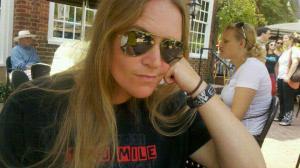
And then it changed, gradually and then all at once. Social media drove me out of my claustrophobic four walls and helped me rediscover myself. How, you ask, could virtual relationships help a lonely woman? And how can a relationship born of the Internet result in authentic connections or mean more than ones engendered by “real life?” In my case, Facebook helps me to connect to other people all over the world who share something much more important than our zip code: common interests in writing, art and running.
Facebook benefits me as a writer even more than it helps me connect with and make friends with like-minded people. If I cannot find a word for a passage in a blog post I am creating, I can ask those kind souls who follow my Facebook Page Running from Hell with El and get a quick answer, a smile and a joke. Some of these online connections run deep. For example, I met my writing partner, Renée Jacobson, via Facebook and she has become both a dear friend and an incredible source of support, advice and help to me as I work on my novel, Ripple.
Most of you know that I am writing Ripple and that I hope to give birth to it by the end of the year. I wouldn’t be honest if I didn’t admit that I also hope that many of the Facebook Page administrators with whom I interact will help me market my finished product. And while I understand that not every person who follows me on Running from Hell with El will buy my book, perhaps some of them will. In other words, Facebook benefits me on a personal and potentially professional level and for this I am eternally grateful.
Facebook is the main form of social media I use, but it is not the only one. I tweet on Twitter and I pin on Pinterest, but I am far from expert at using either social media source. For an expert view on how to use Twitter, please see Nina Badzin’s invaluable article, “Why I follow You on Twitter (and Why I Don’t).” To discover the many benefits offered by Twitter to writers in particular, please do check out Kristen Lamb’s Blog. And for an amazing tutorial on the professional benefits offered to writers and artists via Pinterest please see August McLaughlin’s Blog.
In the meantime, I love to hear from you! How do you use social media and how does it benefit you? Would you like to escape from the endless immersion of social media to the mountains or do you see infinite frontiers of hope and opportunity when you scan the social media landscape?
Dream Big: Ripple, Marathons and Swimming the English Channel
Hello my friends! I apologize I have been so quiet, but I have been on a furious editing pace, trying to get Draft 2 of Ripple done by the end of June. Ripple is more than 450 pages long, or 122,000 words, and I started draft two June 1st . . . so you get the idea.
I had a hard week, to be honest. Some difficult things went down, and I felt like hell on Friday. Pure hell. Instead of surrendering to the fit of melancholy, I took my three kids to the pool and swam a quick 800 meters during break, and this got me thinking. Before my accident in 2009, I was swimming two to three miles a day, and daydreaming about swimming the five miles across the Chesapeake Bay. The bay, however, is not enough. I want to swim across the English Channel.
Now, I get these bright ideas often, and my husband replies the same way each time. He gets a gleam in his eye and his mouth turns up in one of his trademark half-smiles. And then he replies, “Sounds great, Cutie,” or something sweet like that, and I grin at him. That is how we ran two marathons together in 2011. This is how my man and I roll. And it might be what I love about him the most: I come up with some crazy adventure, some faraway dream, and he figures out how we can make it come true.
This is how I keep my “black dog,” as Winston Churchill called his depression, at bay. I dream. I dream big. And with that dream, that goal in mind, I begin to work toward it, and with my energy focused on the future, my present troubles weigh on me less.
I don’t know when I will swim the English Channel, but it reminds me of the challenges I have both created and am overcoming in the process of writing Ripple. This is not an easy first novel by any stretch of the imagination. For one thing, a lot of characters live in its pages. In addition, these characters move and interact at an increasing gallop throughout its pages and the topics addressed are weighty and emotion-packed.
I wanted to share with you what the editing process looks like. For your amusement, what follows is Draft 2, Page 1 of Ripple. As you will see from the excerpt of Draft 1, page 1 of Ripple, almost nothing carried over from the first draft.
Draft 2:
“The trial is in a week, Ashtray,” thundered Helen Thompson, slamming the glass door shut so hard the frame shimmered and vibrated. The young associate nicknamed “Ashtray,” from Baker, Pitts, Kenzey & Moore scurried out of the hotel’s conference room as Helen’s words echoed into the corridor behind him. “I needed the witness list two hours ago! If you can’t get it to me in the next fifteen minutes, you might as well grab a cab to the airport and catch the redeye back to D.C.”
Helen glowered, imperious, her auburn hair and bellowing tone resembling Queen Elizabeth I. If Queen Elizabeth could make a man move before finishing a sentence, Helen could make him run.
Her eyes cut a slow arc around the conference room, searching for anyone who was not meeting her expectations. One hand still on the gold-plated door handle, Helen made eye contact with a bemused, dark-haired senior associate named Carl Hansen, who had worked with Helen for enough years to shrug off her frequent explosions.
Helen waved her hand. “Seriously, I don’t give a shit what’s going on in his personal life. These pimple-faced recent graduates don’t pull their weight.” Helen stomped from one end of the room to another, her 5’6” frame appearing much taller because of her ramrod posture, black custom suit and Manolo Blahniks heels. A senior partner at one of the top law firms in the country, Helen stood astride the legal profession. She did not suffer fools and within that category remained all recent law school graduates until they proved their mettle with years of hard-nosed toil.
As you will see, not much of Draft 1 remained after my writing partner, Renée Schuls-Jacobson and I redlined it. And for your amusement, I attach a picture I found on Facebook that channels Helen Thompson’s personality. The only difference is the hair color of the speaker.
Draft 1:
“Ms. Thompson?” Helen held up one hand impatiently and continued upbraiding her youngest associate, Alex Peterson. “Seriously, Alex, I need that witness list and I needed it a half-hour ago. I don’t give a shit what’s going on in your personal life. Get me that fucking list NOW!” The second-year associate jumped up from the conference room table, his shirt untucked from his suit pants, tie askew, and almost careened into the hotel employee who stood at attention with a phone in his hand. “Excuse me Ms. Thompson for the interruption, but the Judge’s clerk phoned and asked to speak directly to you.”
“Hmm, the judge’s clerk huh,” Helen muttered. “We don’t usually get calls from chambers. Are you sure you got that right?” The employee nodded politely and Helen thought about the studied good manners of all the employees at this swanky Chicago hotel and wondered if they went home at night and told their families what assholes the attorneys from her crack legal team were.
Inwardly she chuckled and realized she didn’t care. At $500 a night, they can get it together to call us “Ma’am” and “Sir” and even open the doors for us. It’s all covered in the rate. “Yes Ma’am. The clerk gave me the direct line for what he called, um,” he glanced at his notepad and continued, “Judge’s Chambers, U.S. District Court, Northern District of California.” Helen’s eyes opened a little wider and she nodded and Carl Min, her crack senior associate, “Right, thank you so much. I suppose that phone is for me?” Helen strode across the room and pivoted, one hand gesturing as the other reached out for the phone. “Yes Ma’am,” the employee replied, and with one hand one the door handle, waited for Helen to take hold of the phone before he let go and unobtrusively left the room as quietly as he had entered it.
Dreams, big dreams, take time and work and pain to bring to fruition. Like running a marathon or swimming across the English Channel, there is nothing easy about editing Ripple. And yet I am having the time of my life.
© E. L. Farris
January 15, 2016
Walking Away: G&T with a Lime on Top
I walk into the kitchen and I smell it before I see it. Lime. Gin. Tonic water. I lick my lips. Remember the old movies? The alcoholic walks into a bar and his face contorts in misery. He licks his lips. He covers his mouth with his hand. He fidgets and shoves his hands in his pockets. And you think to yourself, He’s going to end up drinking. He looks so weak, in so much pain. How can he possibly hold on? Damn him. Damn his for surrendering.
I could walk over and drink it. Or maybe just take out the lime and suck on it.
That’s my favorite part. The lime. Just like my mom’s favorite part of a Manhattan was not the whiskey or the vermouth. It was the maraschino cherry on top. “Why, Mom,” I would say with childlike innocence as a teenager, “Can’t you just pour the cherry juice and a few cherries into a soda and drink the part of it you really like?” She would chuckle, and so would my father as he mixed the Manhattan. That’s one of the things he did well: mix drinks. My brother is good at it too. And then she would wave her hand with a devil-may-care bravado and eat the cherries and drink the whiskey and vermouth. After all, it’s the cherry on top, but the alcohol beneath it, that makes the fucking cherry taste like heaven on earth.
I glare at the lime and the gin and the tonic. It is not my friend. One time, before we had children, we drank many G&Ts and I said,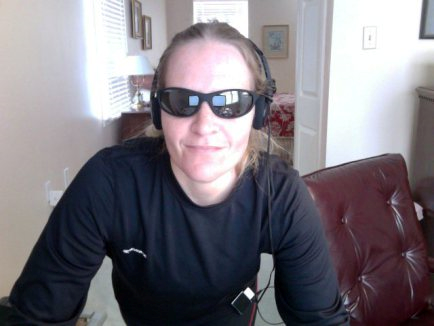 “Let’s paint the dining room.” And he laughed and we got out the blue paint and the rollers and brushes and turned on the music and we had a grand time painting and dancing around until it was . . . stop. Good memory, and good memories are bad when you’re staring at a glistening crystal glass filed with gin and tonic and a lime on top.
“Let’s paint the dining room.” And he laughed and we got out the blue paint and the rollers and brushes and turned on the music and we had a grand time painting and dancing around until it was . . . stop. Good memory, and good memories are bad when you’re staring at a glistening crystal glass filed with gin and tonic and a lime on top.
When do you know you have a drinking problem? Is it when you lick your lips and imagine the liquid burning your throat as it works its way into your belly? Is it when you close your eyes and wait for the buzz that only a stiff drink will bring? Even bad buzzes are good buzzes at least at first. And bad buzzes make worse memories fuzzy. Fuzzy bad memories hurt less than clear memories, clear like crystal glasses filled with . . . stop.
When do you realize you’re an alcoholic? Is it when you mourn, and celebrate all in the same instant, the fact that you turn, and tighten your jaw, and walk away from the glistening crystal glass with the gin and the tonic and the lime on top?
I don’t know. I don’t know anything. Except that I turn, and even as I lick my lips, I walk away from the glistening crystal glass with the gin and the tonic and the lime on top. I walk away tonight, and that’s all that matters. Tomorrow? Tomorrow is another day and I don’t contemplate tomorrow until it’s today.
January 14, 2016
8 Going On 28
I stride toward the elementary school’s front door and set my jaw. I am wearing my usual jeans and blue oxford button down shirt. Blue, gray and orange trail running shoes complete my outfit. I’ve rehearsed all of my lines. I will meet with the speech therapist and decline further services. I will not whine or beg or complain.
“My daughter has had services for 5 years and I appreciate all that you’ve done for her, but she feels like a nerd when you pull her out of class. Yes, I am sure. Thank you so much for everything.”
She’s 8 gone on 28. Then she is 8 again and I’m so confused. I want to hold her tight and promise her, with all of my might, that it is all going to be alright.
My image reflects back at me from the long, tall windows that line the lunchroom to my right and the office on my left. I try not to pay attention to how I look because lately I have been feeling self-conscious. Runners should be thin and I don’t think I look thin. Instead, I gaze through the lunchroom windows and try not to gulp.
One year ago, a boy had said unspeakably inappropriate things to my little girl in that lunchroom and I’d gone into school to talk about it with her teacher. With a helpless shrug, she had murmured, “I have no control over the lunchroom. It’s not within my jurisdiction.” We did not let this Lord of the Flies mentality stand; instead, we requested that my daughter switch to a teacher that did not shrug at bullies. This whole incident, however, had shaken me to my core.
She’s 8 gone on 28. Then she is 8 again and I’m so confused. I want to hold her tight and promise her, with all of my might, that it is all going to be alright.
Last night, we were walking in the woods and Madeline whispered, “Gary and Joey told Lizzie that she sits at the loser table at lunch.”
I scowled as she continued, “And they tell me that too, because I always sit at that table.”
My scowl turned into a howl, “That is UNACCEPTABLE.”
Words strung into sentences and when I was finished, my bespectacled daughter remonstrated, “But Gary can’t help it Mom. He’s popular.”
So as I pass my daughter in the hallway, I wink at her and promise to swing by the lunchroom after meeting with her speech therapist. A look that mixes anxiety with hope and unconditional love passes over her visage like a summer thunderstorm. Then I pull her teacher aside and explain the “loser table” matter to her, and she nods with a sage, somewhat ironic, controlled expression of discontent. I know she will take care of it, so I square my shoulders and rehearse my lines and walk into the speech therapist’s office.
She’s 8 gone on 28. Then she is 8 again and I’m so confused. I want to hold her tight and promise her, with all of my might, that it is all going to be alright.
I am in the meeting now, and I deliver my lines right. It’s hard. I don’t do well in these situations, which is crazy weird for an ex-trial attorney, but the truth is, I deplore confrontations, so I usually avoid them. It turns out that her speech therapy was going to end anyway, with just a few more classroom observations. She will suffer through no more special pullouts that breed a sense of inferiority.
I keep my promise. I amble down to the lunchroom and find my little 8-year old sitting with four other 8-year old girls at the “loser table.” I do not glare at Gary and Joey. They are children too, and at some point they will find the light or fall into the darkness. No matter.
I sit beside my daughter and she pulls her hands up to her head and pushes her hair behind both ears and a question forms in the crease between her wide-set eyes. This will turn into a vertical thinking wrinkle by the time she turns 28 and someone will love her vertical thinking wrinkle as much as my husband loves my three horizontal thinking wrinkles. I don’t hear her question, so I lean toward her and ask her, “What did you say?” She draws close to me and hugs me tight with all her might and I know it is going to be alright.
Do you identify with this conflicting need to hold on and let go, dear reader? She is my only daughter, and my eldest child of three.
January 13, 2016
Shooting Rubber Bands or Howitzers? A Tale about Local Government
As a mother, I wear a lot of hats. Last night, I wore one that fits like a well-worn baseball glove: local activist and pot-stirrer. Another motherand I appeared before the Fairfax County, Virginia Planning Commission to request that a renovation project planned for our children’s elementary school include safety improvements.
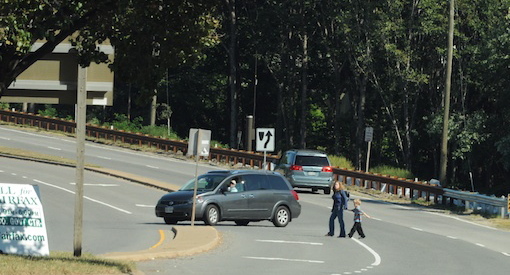
It sounds pretty crazy, as I reflect on this and summarize it for you. We live in a planned “walking community” named Burke Centre that was built in the late 70’s. When it was first built, a two-lane country road divided the North side where I live from the South side, and the school, which we call “The Shire” sat about 100 yards off the road. The speed limit used to be 25 or 30 miles per hour but fifteen years ago, the tractors and rollers and construction trucks blasted a massive swath right through the middle of our idyllic community. This construction left in its wake a seven-lane highway, Burke Centre Parkway (“BCP”) where the cars travel well in excess of the posted speed of 40 mph.
Now get this: there used to be a school zone with flashing lights (wink-o-matics) in front of The Shire, but after they turned the road into a parkway, the Virginia Department of Transportation (“VDOT”) tore down the signs. As far as they were concerned, no child could or should cross the parkway. Burke Centre had changed from a destination to commuter’s connection from one side of Fairfax County to another and in the process, its citizens lost the ability to safely cross from one side of the road to the other.

Many of us have been concerned about the lack of a reduced speed limit, flashing lights, or the establishment of a school zone in the area that abuts our children’s school. There are only enough parking spaces allotted for the teachers and school employees. There is no crosswalk or traffic light at the intersection of The Shire and a shopping center that exists on the opposite side of BCP. From a practical standpoint, many parents must park at this shopping center when they pick up their children or attend school activities throughout the day. Crossing the street requires playing a game of human frogger, as you can see from this video called El’s Frogger in Real Time **PLEASE WATCH–it is only 3 minutes long** we made.
Eighteen months ago, I sent a letter to the Governor and the representatives of both houses of the state legislator, along with the video referenced above and a petition signed by more than 120 parents. In response, the County Supervisor, John Cook, established a Task Force that included the school system, VDOT and local citizens like me, and after months of meetings, we worked out a deal of sorts. VDOT approved a traffic light warrant at the school’s intersection.

Then the school system announced a renovation to The Shire and for reasons we simply cannot comprehend, the school system convinced VDOT to hold off on installing the traffic light. The Task Force then went back to the negotiating table and by majority vote, approved the installation of the Wink-o-Matic and the establishment of a school zone.
And again, the school system shot it down. Fast forward to last night. In a televised hearing, the school system sought approval of its renovation project, and argued that the renovation should not be tied to any safety improvements to the existing or future footprint of the school. The Commissioners grilled the school system: how can you renovate a school WITHOUT taking into account the safety of the very souls the school serves? And they ordered us back to the negotiating table. Again.
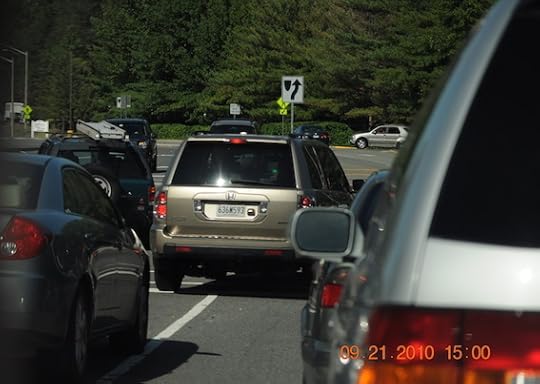
I feel like the main character in Kafka’s The Trial as I, along with the citizens of my community, navigate the confusing and frustrating minefield that is local government. One branch or agency listens to us, and then they tell us they cannot help us. So they send us to another agency or elected official, and they, with smiling countenance, send us somewhere else inside the government. Like Johnny Cash, we’ve been everywhere, man.
Now we stand at a crossroads. On May 3rd, we will represent the beleaguered citizens of Burke Centre before the Planning Commission again. We’ve heard it will never happen—that the County cannot fix what the government destroyed when they widened BCP and removed our wink-o-matic. We believe otherwise.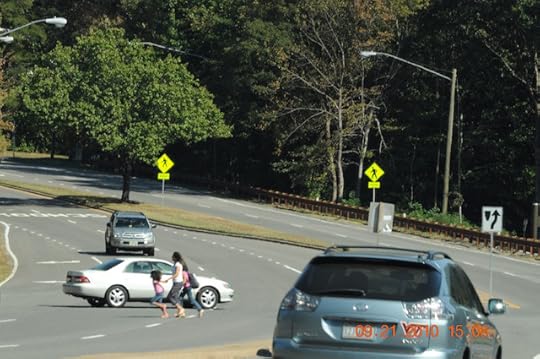
We hope that the Planning Commission will hear its constituents. We hope that our government cares about us. We trust that our local government will put the safety and welfare of our children first. And we will not stop fighting. We will not go away.
What would you do if you were in our shoes?
January 11, 2016
My Thoughts on Love and Marriage Vows
This weekend, my husband and I left our three children with his parents and went away to the mountains. He asked me to unplug from all electronic devices and knowing my lack of control, I left my cell phone lying on the floor of our bedroom here in Northern Virginia.
The same night he asked me to unplug, my husband assured me I could blog about our weekend away; in fact, I’ve been trying to write that blog for three days and I am stuck. The ironic thing is, I never get stuck. I write at a gallop or not at all. So I started thinking, “Why in the hell can’t I write this blog about our vacation?”
The answer came to me as I leaned against the counter at 9:30 a.m. eating a bowl of Kashi Crunch: I can’t write it because I shouldn’t. Our time together is special. Holy. Blessed by a minister, we spoke vows. And the vows are familiar and comfortable and they still, after all of these years, send chills down my spine when I hear them uttered by people who are in love.
Fifteen years ago, Travis and I stood in a chapel in Maryland. A sunbeam sent from the heavens lit our faces as we promised to love one another until “death do us part.” Implied within those words was an unspoken promise. My love for him is not for hire.
“Lighten up,” you might say. “It’s just a blog post about a vacation!” But writing about three days we set aside to recharge and remember why we love one another so damn much feels wrong. It feels like it diminishes my love for the man I married.
You know when I realized this? I arranged a collage on the living room table of our condo at the Wintergreen Resort. The collage told a story about our weekend away. Travis said very little about it, which for him isn’t unusual. He doesn’t talk much. He wasn’t annoyed or upset at me. But he wasn’t amused either. I snapped a few pictures and then I felt dirty, bothered and disgusted with myself.
My love for him is not for hire. And yet there I was, trying to capture the elements of our shared time in a picture so that I could share and in a sense sell. Our love is bigger than that. It cannot be bottled up and served like a bowl of ice cream for my readers.
If I wrote THAT blog, replete with staged pictures about my weekend, I would have been guilty of turning my life, my marriage, and the object of my romantic love, into a stunt. How screwed up is that? We do not live the minutes and hours of our lives between blog posts and status updates. Even as we try to capture the precious milestones that mark our lives, the seconds tick past and if we forget our purpose here, we lose sight of the brighter hues that paint our lives, and our love, with depth and meaning. I am more than that. This one is for you my love. I love you always and forever.
Readers, do you ever feel like you lose sight of what really matters? And fellow bloggers, have you ever gotten carried away with a blogging stunt and regretted it?
January 10, 2016
The Monster’s Daughter Review
 The Monster’s Daughter is the brilliant tale of a vampire’s daughter and it can be appreciated on many levels. For those fans of the Vamp-genre, this novel contains some of the most chilling descriptions of blood lust I have ever read:
The Monster’s Daughter is the brilliant tale of a vampire’s daughter and it can be appreciated on many levels. For those fans of the Vamp-genre, this novel contains some of the most chilling descriptions of blood lust I have ever read:
She sensed so many new nuances to the world. Around her, she heard the soft pitter-patter of hearts pumping blood through living creatures for miles around. She licked her lips at the thought of all that blood.
As fascinating of a description as this is, this novel is about much more than blood lust. It is a coming of age story for a young woman named Genevieve, or “Ginny” as she is known to her family and friends. We see Ginny’s struggles with realization and eventually acceptance of the man her father has become once he undergoes “the change,” and we follow her as she searches for a normal life amid the torn shards of her own tragic existence. We accompany Ginny as she hangs out with her girlfriends and we smile as she steals moments of freedom and meaning with the love of her life, “Joey.” We laugh with her as she teases her friends, and we sit vigil with her as she lives with a cross above her door to repel the father-vampire who she fears in the dead of night.
If The Monster’s Daughter is read as simply a coming of age story for a heroic young woman (and you will have to read the book to see just how heroic she acts for I refuse to spoil it for you), you will love it. If, however, you read it as an allegory for the life of an abused child and young woman, then you will find great satisfaction and perhaps even catharsis as you read the this amazing first novel by author Deborah Bryan. Any abuse survivor will tell you, as Ginny notes,
Her life was not like a half-hour sitcom where her remaining family would gather around the hearth and share a hearty laugh about how they’d all just misunderstood each other.
Instead, Ginny waited for her father to attack her and take her blood, her life, from her, in the exact way that an abused child waits for the abusive parent to initiate the beatings or the sexual assaults. And through it all, Ginny maintains hope and struggles to fix the broken relationships that rock her life down to its very foundations.
What truly amazed me about The Monster’s Daughter was not the allegorical treatment of abuse. In fact, if this novel were written in merely allegorical terms, the characters would not have been drawn with such complexity. All of the principal characters appear multi-dimensionally and character, not allegory, drives the plot. Ginny makes decisions on the fly and under extreme pressure and this character who we grow to love and respect takes her future into her own hands when she decides to fight back against this man, this monster, who is her father. The manner in which Ginny, or Genevieve, chooses to fight the Monster was as unexpected and audacious as this reader, for one, could have imagined, and rather than spoil the plot for you, dear reader, I strongly recommend that you purchase The Monster’s Daughter and observe Genevieve’s desperate battle for yourself.

